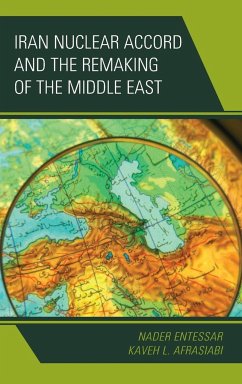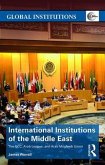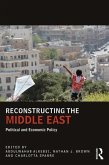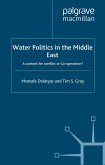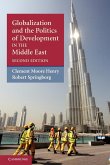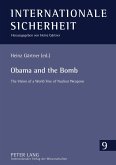- Gebundenes Buch
- Merkliste
- Auf die Merkliste
- Bewerten Bewerten
- Teilen
- Produkt teilen
- Produkterinnerung
- Produkterinnerung
Entessar & Afrasiabi's Iran Nuclear Negotiations (Rowman & Littlefied, October 2015) offered a thorough analysis of the negotiation process between Iran and the 5+1 great powers about its nuclear program. This book essentially builds upon it, focusing this time on the final nuclear agreement, the ensuing debates around it, and its global and regional ramifications especially in the Middle East. The first section analyzes the agreement through the prism of international relations theories, using a constructivist-critical theory approach. This is followed by an overview of the intense debates in…mehr
Andere Kunden interessierten sich auch für
![International Institutions of the Middle East International Institutions of the Middle East]() James WorrallInternational Institutions of the Middle East57,99 €
James WorrallInternational Institutions of the Middle East57,99 €![Reconstructing the Middle East Reconstructing the Middle East]() Reconstructing the Middle East75,99 €
Reconstructing the Middle East75,99 €![Conspiracy Theories in the Arab World Conspiracy Theories in the Arab World]() Matthew GrayConspiracy Theories in the Arab World68,99 €
Matthew GrayConspiracy Theories in the Arab World68,99 €![Water Politics in the Middle East Water Politics in the Middle East]() M. DolatyarWater Politics in the Middle East118,99 €
M. DolatyarWater Politics in the Middle East118,99 €![International Institutions of the Middle East International Institutions of the Middle East]() James WorrallInternational Institutions of the Middle East193,99 €
James WorrallInternational Institutions of the Middle East193,99 €![Globalization and the Politics of Development in the Middle East Globalization and the Politics of Development in the Middle East]() Clement Moore HenryGlobalization and the Politics of Development in the Middle East38,99 €
Clement Moore HenryGlobalization and the Politics of Development in the Middle East38,99 €![Obama and the Bomb Obama and the Bomb]() Obama and the Bomb53,50 €
Obama and the Bomb53,50 €-
-
-
Entessar & Afrasiabi's Iran Nuclear Negotiations (Rowman & Littlefied, October 2015) offered a thorough analysis of the negotiation process between Iran and the 5+1 great powers about its nuclear program. This book essentially builds upon it, focusing this time on the final nuclear agreement, the ensuing debates around it, and its global and regional ramifications especially in the Middle East. The first section analyzes the agreement through the prism of international relations theories, using a constructivist-critical theory approach. This is followed by an overview of the intense debates in Iran, the West, and other parts of the world, on the nuclear agreement and its various pros and cons, not to mention the connected, yet separate Iran-IAEA agreement. The second section covers Iran's foreign policy and its various priorities, looking in particular at the impact of the nuclear deal on the country's external relations and orientations, contextualized in terms of pre-existing issues and concerns and the profound influence of the nuclear agreement on the perceptions of Iranian power in the region and beyond. Iran's relations with its Arab, Turkish, Russian, and other neighbors are discussed, focusing on both the direct and indirect impact of the nuclear agreement on these relations, especially the paradoxical implications of the nuclear deal with respect to the non-nuclear crises in the Middle East, such as the Syria-Iraq crisis, and the re-alignments that have put Iran at the crossroads of East and West. Other issues covered include energy security, regional economic cooperation, the endemic sectarianism highlighted by Iran-Saudi competition, and the deadlock on the Middle East peace process.
Produktdetails
- Produktdetails
- Verlag: Rowman & Littlefield
- Seitenzahl: 298
- Erscheinungstermin: 1. Januar 2018
- Englisch
- Abmessung: 235mm x 157mm x 22mm
- Gewicht: 606g
- ISBN-13: 9781442271272
- ISBN-10: 1442271272
- Artikelnr.: 48893734
- Verlag: Rowman & Littlefield
- Seitenzahl: 298
- Erscheinungstermin: 1. Januar 2018
- Englisch
- Abmessung: 235mm x 157mm x 22mm
- Gewicht: 606g
- ISBN-13: 9781442271272
- ISBN-10: 1442271272
- Artikelnr.: 48893734
Nader Entessar is Professor Emeritus and former Chair of the Department of Political Science and Criminal Justice at the University of South Alabama where he specializes in the politics of the developing areas (especially the Middle East) as well as foreign policy decision-making, defense and security, and North-South issues.
Introduction Part One: The Nuclear Agreement: Dimensions and Analysis
Chapter One: The Landmark Agreement and its Content Chapter Two: The Other
Agreement: Iran and IAEA Chapter Three: Debating the Agreement: Role of IR
Theories Part Two: Nuclear Agreement and the Re-Making of Iran's Foreign
Policy Chapter Four: Iran's Foreign Policy Priorities and New Opportunities
Chapter Five: Impact on Iran's Relations with the Arab World Chapter Six:
Impact on Iran-Turkey Relations Chapter Seven: Nuclear Agreement and
Regional Arms Race Chapter Eight: Iran, Between Russia and US Part Three:
Nuclear Agreement and Regional Non-Proliferation Chapter Nine: Origins and
Evolution of the Idea of a WMD-Free Region Chapter Ten: The Question of
Israel's Nuclear Arsenal Chapter Eleven: The Road Ahead For Regional
Non-Proliferation Part IV: Future Prospects in the Middle East Chapter
Twelve: Building Scenarios Chapter Thirteen: Toward A Peaceful Middle East
Conclusion Chapter abstracts (Detailed description of the contents,
outlining each chapter's main arguments, themes, and scope.) Part I: The
Nuclear Agreement: Dimensions and Analysis Chapter One: The Landmark
Agreement and its Content This chapter presents an in-depth examination of
the final nuclear agreement, the nature of compromises made by both sides,
the bilateral and multilateral rounds that led to it, and the various
aspects of the agreement's legal and political dimensions. Chapter Two: The
Other Agreement: Iran and IAEA The separate agreement between Iran and the
International Atomic Energy Agency (IAEA) is the focus of this chapter,
conceived as parallel to and complementing the final accord. Sub-sections
include discussion of the "possible military dimension" and the IAEA
reports, etc. Chapter Three: Debating the Agreement: Role of IR Theories In
this chapter, the authors apply different IR theories to the Iran nuclear
issue, evaluating each approach's insights and shortcomings, opting for a
self-constructed critical-constructivist approach that, when applied to the
nuclear accord, leads to a revision of the dominant interpretations of the
nuclear agreement. Part II: Nuclear Agreement and the Re-Making of Iran's
Foreign Policy Chapter Four: Iran's Foreign Policy Priorities and New
Opportunities This chapter looks at Iran's foreign priorities and the new
opportunities for advancing Iran's external interests as a result of the
nuclear agreement. Chapter Five: Impact on Iran's Relations with the Arab
World The final agreement's impact on Iran's relations with the Arab world
forms this chapter's priority, focusing in particular on the Saudi-led Gulf
Cooperation Council and the divisions among the GCC states on Iran,
accentuated by the nuclear deal. The thesis of this chapter is that the
impact on these relations is highly uncertain and paradoxical, depending on
several regional and internal factors. Chapter Six: Impact on Iran-Turkey
Relations The question of how the nuclear deal has affected Iran-Turkey
relations is the focus of this chapter, looking at the trade, energy, and
regional security dimensions, including the conflict in Syria. An evolution
of these relations due to the lifting of sanctions is predicted, hinging on
several political factors. Chapter Seven: Nuclear Agreement and Regional
Arms Race This chapter examines the issue of arms race in Iran's region,
looking in particular at Iran-GCC military (im)balance and the role of
Iran's 'asymmetrical' missiles, etc. Chapter Eight: Iran, Between Russia
and US This chapter compares and contrasts Iran-Russia and Iran-US
relations and argues that the nuclear agreement has created an entirely new
dynamic that has put Iran at the crossroad of Russia and US. Part III:
Nuclear Agreement and Regional Non-Proliferation Chapter Nine: Origins and
Evolution of the Idea of A WMD-Free Region The question of relations
between the nuclear accord and a nuclear weapons-free zone in the Middle
East is the topic of this chapter that includes discussion of the NPT
review conferences and the future of the WMD-free zone in the aftermath of
the nuclear deal. Chapter Ten: The Question of Israel's Nuclear Arsenal The
question of Israel's nuclear arsenal and the implications of Israel's
monopoly of nuclear weapons in the region are discussed in this chapter,
contextualized in terms of the efforts by the international community to
bring Israel within the NPT framework and the like. Chapter Eleven: The
Road Ahead For Regional Non-Proliferation This chapter seeks to provide a
'troubleshooting' prognostication of the challenges and difficulties of
future non-proliferation in the Middle East, as a follow-up to the previous
two chapters, offering recommendations and an action plan. Part IV: Future
Prospects in the Middle East This chapter examines the broader trends in
terms of development, peace, and conflict in the Middle East, and how the
nuclear agreement has re-shaped the overall patterns of political and
strategic interactions in the volatile region. Chapter Twelve: Building
Scenarios This chapter examines broader trends in development, peace and
conflict in the Middle East. It also examines how the Iran nuclear
agreement has reshaped the overall patterns of political and strategic
interactions in the volatile region. Chapter Thirteen: Toward A Peaceful
Middle East In this chapter, the ideal of peaceful Middle East is studied
from the critical-constructivist approach, taking into consideration the
Western containment strategy toward Iran and the like. Conclusion The
conclusion provides a summary of the preceding discussions, hypotheses and
assumptions, highlighting the main contributions and insights of the book.
Chapter One: The Landmark Agreement and its Content Chapter Two: The Other
Agreement: Iran and IAEA Chapter Three: Debating the Agreement: Role of IR
Theories Part Two: Nuclear Agreement and the Re-Making of Iran's Foreign
Policy Chapter Four: Iran's Foreign Policy Priorities and New Opportunities
Chapter Five: Impact on Iran's Relations with the Arab World Chapter Six:
Impact on Iran-Turkey Relations Chapter Seven: Nuclear Agreement and
Regional Arms Race Chapter Eight: Iran, Between Russia and US Part Three:
Nuclear Agreement and Regional Non-Proliferation Chapter Nine: Origins and
Evolution of the Idea of a WMD-Free Region Chapter Ten: The Question of
Israel's Nuclear Arsenal Chapter Eleven: The Road Ahead For Regional
Non-Proliferation Part IV: Future Prospects in the Middle East Chapter
Twelve: Building Scenarios Chapter Thirteen: Toward A Peaceful Middle East
Conclusion Chapter abstracts (Detailed description of the contents,
outlining each chapter's main arguments, themes, and scope.) Part I: The
Nuclear Agreement: Dimensions and Analysis Chapter One: The Landmark
Agreement and its Content This chapter presents an in-depth examination of
the final nuclear agreement, the nature of compromises made by both sides,
the bilateral and multilateral rounds that led to it, and the various
aspects of the agreement's legal and political dimensions. Chapter Two: The
Other Agreement: Iran and IAEA The separate agreement between Iran and the
International Atomic Energy Agency (IAEA) is the focus of this chapter,
conceived as parallel to and complementing the final accord. Sub-sections
include discussion of the "possible military dimension" and the IAEA
reports, etc. Chapter Three: Debating the Agreement: Role of IR Theories In
this chapter, the authors apply different IR theories to the Iran nuclear
issue, evaluating each approach's insights and shortcomings, opting for a
self-constructed critical-constructivist approach that, when applied to the
nuclear accord, leads to a revision of the dominant interpretations of the
nuclear agreement. Part II: Nuclear Agreement and the Re-Making of Iran's
Foreign Policy Chapter Four: Iran's Foreign Policy Priorities and New
Opportunities This chapter looks at Iran's foreign priorities and the new
opportunities for advancing Iran's external interests as a result of the
nuclear agreement. Chapter Five: Impact on Iran's Relations with the Arab
World The final agreement's impact on Iran's relations with the Arab world
forms this chapter's priority, focusing in particular on the Saudi-led Gulf
Cooperation Council and the divisions among the GCC states on Iran,
accentuated by the nuclear deal. The thesis of this chapter is that the
impact on these relations is highly uncertain and paradoxical, depending on
several regional and internal factors. Chapter Six: Impact on Iran-Turkey
Relations The question of how the nuclear deal has affected Iran-Turkey
relations is the focus of this chapter, looking at the trade, energy, and
regional security dimensions, including the conflict in Syria. An evolution
of these relations due to the lifting of sanctions is predicted, hinging on
several political factors. Chapter Seven: Nuclear Agreement and Regional
Arms Race This chapter examines the issue of arms race in Iran's region,
looking in particular at Iran-GCC military (im)balance and the role of
Iran's 'asymmetrical' missiles, etc. Chapter Eight: Iran, Between Russia
and US This chapter compares and contrasts Iran-Russia and Iran-US
relations and argues that the nuclear agreement has created an entirely new
dynamic that has put Iran at the crossroad of Russia and US. Part III:
Nuclear Agreement and Regional Non-Proliferation Chapter Nine: Origins and
Evolution of the Idea of A WMD-Free Region The question of relations
between the nuclear accord and a nuclear weapons-free zone in the Middle
East is the topic of this chapter that includes discussion of the NPT
review conferences and the future of the WMD-free zone in the aftermath of
the nuclear deal. Chapter Ten: The Question of Israel's Nuclear Arsenal The
question of Israel's nuclear arsenal and the implications of Israel's
monopoly of nuclear weapons in the region are discussed in this chapter,
contextualized in terms of the efforts by the international community to
bring Israel within the NPT framework and the like. Chapter Eleven: The
Road Ahead For Regional Non-Proliferation This chapter seeks to provide a
'troubleshooting' prognostication of the challenges and difficulties of
future non-proliferation in the Middle East, as a follow-up to the previous
two chapters, offering recommendations and an action plan. Part IV: Future
Prospects in the Middle East This chapter examines the broader trends in
terms of development, peace, and conflict in the Middle East, and how the
nuclear agreement has re-shaped the overall patterns of political and
strategic interactions in the volatile region. Chapter Twelve: Building
Scenarios This chapter examines broader trends in development, peace and
conflict in the Middle East. It also examines how the Iran nuclear
agreement has reshaped the overall patterns of political and strategic
interactions in the volatile region. Chapter Thirteen: Toward A Peaceful
Middle East In this chapter, the ideal of peaceful Middle East is studied
from the critical-constructivist approach, taking into consideration the
Western containment strategy toward Iran and the like. Conclusion The
conclusion provides a summary of the preceding discussions, hypotheses and
assumptions, highlighting the main contributions and insights of the book.
Introduction Part One: The Nuclear Agreement: Dimensions and Analysis
Chapter One: The Landmark Agreement and its Content Chapter Two: The Other
Agreement: Iran and IAEA Chapter Three: Debating the Agreement: Role of IR
Theories Part Two: Nuclear Agreement and the Re-Making of Iran's Foreign
Policy Chapter Four: Iran's Foreign Policy Priorities and New Opportunities
Chapter Five: Impact on Iran's Relations with the Arab World Chapter Six:
Impact on Iran-Turkey Relations Chapter Seven: Nuclear Agreement and
Regional Arms Race Chapter Eight: Iran, Between Russia and US Part Three:
Nuclear Agreement and Regional Non-Proliferation Chapter Nine: Origins and
Evolution of the Idea of a WMD-Free Region Chapter Ten: The Question of
Israel's Nuclear Arsenal Chapter Eleven: The Road Ahead For Regional
Non-Proliferation Part IV: Future Prospects in the Middle East Chapter
Twelve: Building Scenarios Chapter Thirteen: Toward A Peaceful Middle East
Conclusion Chapter abstracts (Detailed description of the contents,
outlining each chapter's main arguments, themes, and scope.) Part I: The
Nuclear Agreement: Dimensions and Analysis Chapter One: The Landmark
Agreement and its Content This chapter presents an in-depth examination of
the final nuclear agreement, the nature of compromises made by both sides,
the bilateral and multilateral rounds that led to it, and the various
aspects of the agreement's legal and political dimensions. Chapter Two: The
Other Agreement: Iran and IAEA The separate agreement between Iran and the
International Atomic Energy Agency (IAEA) is the focus of this chapter,
conceived as parallel to and complementing the final accord. Sub-sections
include discussion of the "possible military dimension" and the IAEA
reports, etc. Chapter Three: Debating the Agreement: Role of IR Theories In
this chapter, the authors apply different IR theories to the Iran nuclear
issue, evaluating each approach's insights and shortcomings, opting for a
self-constructed critical-constructivist approach that, when applied to the
nuclear accord, leads to a revision of the dominant interpretations of the
nuclear agreement. Part II: Nuclear Agreement and the Re-Making of Iran's
Foreign Policy Chapter Four: Iran's Foreign Policy Priorities and New
Opportunities This chapter looks at Iran's foreign priorities and the new
opportunities for advancing Iran's external interests as a result of the
nuclear agreement. Chapter Five: Impact on Iran's Relations with the Arab
World The final agreement's impact on Iran's relations with the Arab world
forms this chapter's priority, focusing in particular on the Saudi-led Gulf
Cooperation Council and the divisions among the GCC states on Iran,
accentuated by the nuclear deal. The thesis of this chapter is that the
impact on these relations is highly uncertain and paradoxical, depending on
several regional and internal factors. Chapter Six: Impact on Iran-Turkey
Relations The question of how the nuclear deal has affected Iran-Turkey
relations is the focus of this chapter, looking at the trade, energy, and
regional security dimensions, including the conflict in Syria. An evolution
of these relations due to the lifting of sanctions is predicted, hinging on
several political factors. Chapter Seven: Nuclear Agreement and Regional
Arms Race This chapter examines the issue of arms race in Iran's region,
looking in particular at Iran-GCC military (im)balance and the role of
Iran's 'asymmetrical' missiles, etc. Chapter Eight: Iran, Between Russia
and US This chapter compares and contrasts Iran-Russia and Iran-US
relations and argues that the nuclear agreement has created an entirely new
dynamic that has put Iran at the crossroad of Russia and US. Part III:
Nuclear Agreement and Regional Non-Proliferation Chapter Nine: Origins and
Evolution of the Idea of A WMD-Free Region The question of relations
between the nuclear accord and a nuclear weapons-free zone in the Middle
East is the topic of this chapter that includes discussion of the NPT
review conferences and the future of the WMD-free zone in the aftermath of
the nuclear deal. Chapter Ten: The Question of Israel's Nuclear Arsenal The
question of Israel's nuclear arsenal and the implications of Israel's
monopoly of nuclear weapons in the region are discussed in this chapter,
contextualized in terms of the efforts by the international community to
bring Israel within the NPT framework and the like. Chapter Eleven: The
Road Ahead For Regional Non-Proliferation This chapter seeks to provide a
'troubleshooting' prognostication of the challenges and difficulties of
future non-proliferation in the Middle East, as a follow-up to the previous
two chapters, offering recommendations and an action plan. Part IV: Future
Prospects in the Middle East This chapter examines the broader trends in
terms of development, peace, and conflict in the Middle East, and how the
nuclear agreement has re-shaped the overall patterns of political and
strategic interactions in the volatile region. Chapter Twelve: Building
Scenarios This chapter examines broader trends in development, peace and
conflict in the Middle East. It also examines how the Iran nuclear
agreement has reshaped the overall patterns of political and strategic
interactions in the volatile region. Chapter Thirteen: Toward A Peaceful
Middle East In this chapter, the ideal of peaceful Middle East is studied
from the critical-constructivist approach, taking into consideration the
Western containment strategy toward Iran and the like. Conclusion The
conclusion provides a summary of the preceding discussions, hypotheses and
assumptions, highlighting the main contributions and insights of the book.
Chapter One: The Landmark Agreement and its Content Chapter Two: The Other
Agreement: Iran and IAEA Chapter Three: Debating the Agreement: Role of IR
Theories Part Two: Nuclear Agreement and the Re-Making of Iran's Foreign
Policy Chapter Four: Iran's Foreign Policy Priorities and New Opportunities
Chapter Five: Impact on Iran's Relations with the Arab World Chapter Six:
Impact on Iran-Turkey Relations Chapter Seven: Nuclear Agreement and
Regional Arms Race Chapter Eight: Iran, Between Russia and US Part Three:
Nuclear Agreement and Regional Non-Proliferation Chapter Nine: Origins and
Evolution of the Idea of a WMD-Free Region Chapter Ten: The Question of
Israel's Nuclear Arsenal Chapter Eleven: The Road Ahead For Regional
Non-Proliferation Part IV: Future Prospects in the Middle East Chapter
Twelve: Building Scenarios Chapter Thirteen: Toward A Peaceful Middle East
Conclusion Chapter abstracts (Detailed description of the contents,
outlining each chapter's main arguments, themes, and scope.) Part I: The
Nuclear Agreement: Dimensions and Analysis Chapter One: The Landmark
Agreement and its Content This chapter presents an in-depth examination of
the final nuclear agreement, the nature of compromises made by both sides,
the bilateral and multilateral rounds that led to it, and the various
aspects of the agreement's legal and political dimensions. Chapter Two: The
Other Agreement: Iran and IAEA The separate agreement between Iran and the
International Atomic Energy Agency (IAEA) is the focus of this chapter,
conceived as parallel to and complementing the final accord. Sub-sections
include discussion of the "possible military dimension" and the IAEA
reports, etc. Chapter Three: Debating the Agreement: Role of IR Theories In
this chapter, the authors apply different IR theories to the Iran nuclear
issue, evaluating each approach's insights and shortcomings, opting for a
self-constructed critical-constructivist approach that, when applied to the
nuclear accord, leads to a revision of the dominant interpretations of the
nuclear agreement. Part II: Nuclear Agreement and the Re-Making of Iran's
Foreign Policy Chapter Four: Iran's Foreign Policy Priorities and New
Opportunities This chapter looks at Iran's foreign priorities and the new
opportunities for advancing Iran's external interests as a result of the
nuclear agreement. Chapter Five: Impact on Iran's Relations with the Arab
World The final agreement's impact on Iran's relations with the Arab world
forms this chapter's priority, focusing in particular on the Saudi-led Gulf
Cooperation Council and the divisions among the GCC states on Iran,
accentuated by the nuclear deal. The thesis of this chapter is that the
impact on these relations is highly uncertain and paradoxical, depending on
several regional and internal factors. Chapter Six: Impact on Iran-Turkey
Relations The question of how the nuclear deal has affected Iran-Turkey
relations is the focus of this chapter, looking at the trade, energy, and
regional security dimensions, including the conflict in Syria. An evolution
of these relations due to the lifting of sanctions is predicted, hinging on
several political factors. Chapter Seven: Nuclear Agreement and Regional
Arms Race This chapter examines the issue of arms race in Iran's region,
looking in particular at Iran-GCC military (im)balance and the role of
Iran's 'asymmetrical' missiles, etc. Chapter Eight: Iran, Between Russia
and US This chapter compares and contrasts Iran-Russia and Iran-US
relations and argues that the nuclear agreement has created an entirely new
dynamic that has put Iran at the crossroad of Russia and US. Part III:
Nuclear Agreement and Regional Non-Proliferation Chapter Nine: Origins and
Evolution of the Idea of A WMD-Free Region The question of relations
between the nuclear accord and a nuclear weapons-free zone in the Middle
East is the topic of this chapter that includes discussion of the NPT
review conferences and the future of the WMD-free zone in the aftermath of
the nuclear deal. Chapter Ten: The Question of Israel's Nuclear Arsenal The
question of Israel's nuclear arsenal and the implications of Israel's
monopoly of nuclear weapons in the region are discussed in this chapter,
contextualized in terms of the efforts by the international community to
bring Israel within the NPT framework and the like. Chapter Eleven: The
Road Ahead For Regional Non-Proliferation This chapter seeks to provide a
'troubleshooting' prognostication of the challenges and difficulties of
future non-proliferation in the Middle East, as a follow-up to the previous
two chapters, offering recommendations and an action plan. Part IV: Future
Prospects in the Middle East This chapter examines the broader trends in
terms of development, peace, and conflict in the Middle East, and how the
nuclear agreement has re-shaped the overall patterns of political and
strategic interactions in the volatile region. Chapter Twelve: Building
Scenarios This chapter examines broader trends in development, peace and
conflict in the Middle East. It also examines how the Iran nuclear
agreement has reshaped the overall patterns of political and strategic
interactions in the volatile region. Chapter Thirteen: Toward A Peaceful
Middle East In this chapter, the ideal of peaceful Middle East is studied
from the critical-constructivist approach, taking into consideration the
Western containment strategy toward Iran and the like. Conclusion The
conclusion provides a summary of the preceding discussions, hypotheses and
assumptions, highlighting the main contributions and insights of the book.

